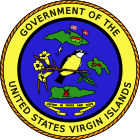
The United States Virgin Islands, officially the Virgin Islands of the United States, are a group of Caribbean islands and a territory of the United States. The islands are geographically part of the Virgin Islands archipelago and are located in the Leeward Islands of the Lesser Antilles. The islands have a tropical climate.

Politics of the United States Virgin Islands takes place in a framework of a presidential representative democratic dependency, whereby the governor is the head of the territory's government, and of a multi-party system. United States Virgin Islands are an unincorporated and organized territory of the United States, administered by the Office of Insular Affairs of the United States Department of the Interior. Executive power is exercised by the local government of the Virgin Islands. The judiciary is independent of the executive and the legislature.

The California State Senate is the upper house of the California State Legislature, the lower house being the California State Assembly. The state senate convenes, along with the state assembly, at the California State Capitol in Sacramento.

The Legislative Assembly of Alberta is the deliberative assembly of the province of Alberta, Canada. It sits in the Alberta Legislature Building in Edmonton. Since 2012 the Legislative Assembly has had 87 members, elected first past the post from single-member electoral districts. Bills passed by the Legislative Assembly are given royal assent by the lieutenant governor of Alberta, as the viceregal representative of the King of Canada. The Legislative Assembly and the Lieutenant Governor together make up the unicameral Alberta Legislature.

Elections in the U.S. Virgin Islands are held to elect senators to the Legislature of the U.S. Virgin Islands, the governor and lieutenant governor of the territory, and a delegate to the United States House of Representatives.

The Democratic Party of the Virgin Islands is a political party in the U.S. Virgin Islands, and is affiliated with the Democratic Party at the nationwide level. It won the gubernatorial election of 2022 when the incumbent Democratic governor Albert Bryan was elected with 56 percent of the vote. In the last lesiglative election in November 2022, the party won 11 out of 15 seats in the Legislature of the Virgin Islands. Out of 30,000 active registered voters in the U.S. Virgin Islands, approximately 20,000 voters are registered Democrats.
At large is a description for members of a governing body who are elected or appointed to represent a whole membership or population, rather than a subset. In multi-hierarchical bodies, the term rarely extends to a tier beneath the highest division. A contrast is implied, with certain electoral districts or narrower divisions. It can be given to the associated territory, if any, to denote its undivided nature, in a specific context. Unambiguous synonyms are the prefixes of cross-, all- or whole-, such as cross-membership, or all-state.

The Northern Mariana Islands Commonwealth Legislature is the territorial legislature of the U.S. commonwealth of the Northern Mariana Islands. The legislative branch of the territory is bicameral, consisting of a 20-member lower House of Representatives, and an upper house Senate with nine senators. Representatives serve two-year terms and senators serve four-year terms, both without term limits. The territorial legislature meets in the commonwealth capital of Saipan.

The American Samoa Fono is the territorial legislature of American Samoa. Like most states and territorial legislatures of the United States, it is a bicameral legislature with a House of Representatives and a Senate. The legislature is located in Fagatogo along Pago Pago harbor.

The House of Assembly of the British Virgin Islands, until 2007 known as the Legislative Council, has 15 members: 13 directly elected for four-year terms, and two ex officio members.

The Legislature of Guam is the law-making body for the United States territory of Guam. The unicameral legislative branch consists of fifteen senators, each serving for a two-year term. All members of the legislature are elected at-large with the island under one whole district. After the enactment of the Guam Organic Act in 1950, the First Guam Legislature was elected composing of 21 elected members. Today, the current fifteen-member 37th Guam Legislature was elected in November 2022.

The Legislature of the Virgin Islands is the territorial legislature of the United States Virgin Islands. The legislative branch of the unincorporated U.S. territory is unicameral, with a single house consisting of 15 senators, elected to two-year terms without term limits. The legislature meets in Charlotte Amalie on the island of St. Thomas.
A term of office, electoral term, or parliamentary term is the length of time a person serves in a particular elected office. In many jurisdictions there is a defined limit on how long terms of office may be before the officeholder must be subject to re-election. Some jurisdictions exercise term limits, setting a maximum number of terms an individual may hold in a particular office.

Albert Bryan Jr. is a Virgin Islander politician serving since 2019 as the ninth governor of the United States Virgin Islands.

The 35th Virgin Islands Legislature was a meeting of the Legislature of the Virgin Islands. It convened in Charlotte Amalie on January 9, 2023 until December 19, 2024, during the first two years of Governor Albert Bryan’s second term.
The 1970 United States Virgin Islands general election in large part took place on November 3, 1970, to elect public officials in the United States Virgin Islands, with a run-off for the gubernatorial race taking place on November 17, 1970.
The 1970 United States Virgin Islands general election took place on July 30, 1972, to elect public officials in the United States Virgin Islands.

The 1976 United States Virgin Islands general election took place on November 9, 1976, to elect public officials in the United States Virgin Islands.












